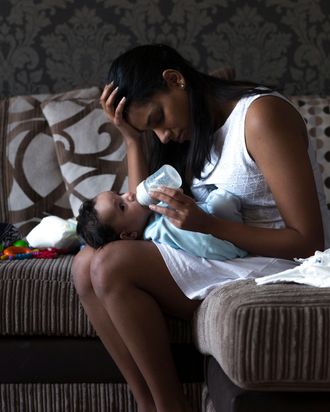
Since the pandemic started, Marcella Kocolatos has been receiving calls from hundreds of distressed parents each month — an up to 400 percent increase from last year. They flood the legal hotline she runs for the family-rights organization a Better Balance, worried that they won’t be able to keep their jobs while looking after their kids, and will be forced to somehow survive without a paycheck. Kocolatos says they are shocked and relieved to hear that as caregivers, they might qualify for up to 12 weeks of paid leave because of a coronavirus-related law the federal government passed in March. But she worries about all the people who will never find out, in large part because the Trump administration has done very little to inform them.
“It’s devastating,” she said. “There must be so many people who have no idea.”
Two paid-leave provisions under the Family First Coronavirus Response Act (FFCRA) have the potential to save lives and keep families from financial ruin, if only more people knew they existed. Parents with sick children or kids who can’t access school or child care due to COVID-19 can apply for the Emergency Paid Sick Leave Act and the Emergency Family and Medical Leave Expansion Act (the former also covers employees who themselves are sick). And while there are problematic loopholes that limit coverage for certain employees, these benefits are meaningful at a time when mothers in particular, who still do the majority of the housework and child care, are being squeezed in every direction (the U.S. is the only industrialized country that doesn’t have a national paid-leave policy). In September, 865,000 women were pushed out of the workforce — a rate four times higher than men. This includes both women who left their jobs to become full-time caregivers and those who were laid off, since the recession has hit female-dominated industries like hospitality and retail especially hard. Unemployment is also highest for low-income, BIPOC women who didn’t have great benefits or work-from-home flexibility to begin with.
The pandemic has created a caregiving crisis, and paid-leave experts say the Trump administration should be scrambling to promote its lifeline to drowning families and their employers. But instead, they say the Department of Labor (DoL) has been largely mum: More than half of Americans have heard either nothing or very little about the relief, according to polling from the organization Paid Leave for All Action. The nonprofit recently ran a focus group that found participants had “no familiarity with the emergency paid leave or child-care policies that went into effect during the pandemic.” There is “a complete lack of awareness” that these benefits exist, according to Dawn Huckelbridge, Paid Leave for All’s director. “We’ve been desperately trying to get the word out.”
A DoL spokesperson told the Cut that once the FFCRA became law, the department “acted immediately to provide clear guidance.” As of October 12, it had aired roughly 18,000 PSAs about the FFCRA leave on the radio, TV, and online, and investigated more than 3,000 cases to make sure employers were complying with the requirements, according to the spokesperson.
Experts say that the effort is too little, too late. It wasn’t until July — four months after the DoL passed the paid leave — that it launched a public-awareness campaign, after months of pressure from advocates. In the absence of federal government efforts, labor-rights organizations have taken it upon themselves to inform families of these benefits before the FFCRA leave expires at the end of December. But they are angry about what seems like the administration’s attempt to keep this information from the people who need it most, like overburdened mothers who are at risk of becoming part of an already dismal unemployment statistic.
Ellen Bravo, a strategic adviser with the nonprofit Family Values @ Work, says it’s “criminal” that the Labor Department has been “sitting on getting [families] that aid.” Rather than seeing the emergency paid leave as a partial solution to a spiraling crisis, Huckelbridge thinks the administration is simply “running out the clock” on these benefits. “It’s cruel because it feels deliberate,” Bravo says. The stakes to this silence are high: When people lose their jobs to care for children, they often lose their health insurance and have to rely on getting unemployment payments in a backlogged system. They might not be able to afford the basics: rent, food, medication. If more people accessed this care there would be a “lower death count, lower case count, lower poverty rate, and lower unemployment rate,” says Bravo.
The FFCRA leave is by no means a perfect solution. The benefits leave out more than 100 million workers, exempts employers with more than 500 staff members (and in certain cases, those with fewer than 50 staffers) as well as health-care workers and first responders, forcing them to “literally choose between their life and their livelihood,” according to Huckelbridge. But it’s better than no paid-leave provisions at all.
And luckily, getting these benefits is a fairly simple process. There’s no application form; instead, parents need to give their managers a written request explaining when they want to take leave, the reason they need it, information about their child and a statement that nobody else is available for child care. Employers then use that information to apply for tax credits to cover the cost of their wages. And anyone with specific questions about their situation can call organizations like a Better Balance or a DoL worker at 866-4US-WAGE.
The FFCRA has been life-changing for the families who knew about it. Kocolatos and her team heard from a mother who couldn’t work because her son had to quarantine, but was still able to keep her income and benefits, and a father who was laid off after asking for time off when his son’s day care closed, but was able to get his job back and take 12 weeks of paid leave.
“It’s been extremely gratifying to be able to tell many women, and some dads, ‘There actually is a law that I think can help you,’” she said. “But it makes me wonder how many people are not finding us and have no idea they might be entitled to these benefits.”





